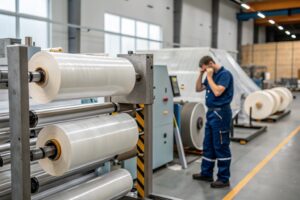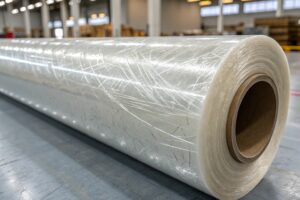What common problems can open masterbatch solve in PET production?

Are you tired of PET films sticking together? I’ve had batches ruined by uneven surfaces. It’s frustrating, but I found a solution that works.
Open masterbatch fixes sticking, rough surfaces, and slow production in PET manufacturing. It improves slip, smooths films, and speeds up the process—keeping my output steady.
I’ve got more to share. Keep reading—I’ll show you how this stuff solves my biggest headaches step by step.
Why does PET film stick together during production?
Ever seen PET film cling like it’s glued? I have. It wastes time and kills batches. I hated it until I figured out a fix.
PET films stick because of high surface tension. Open masterbatch adds slip agents. It stops adhesion and keeps films apart during stacking.

My sticking nightmare
I once had a client order 10,000 PET sheets. Halfway through, the films stuck together. I had to scrap the run. It was a mess. Sticking comes from surface tension and static. It’s worse in humid weather or fast lines. Open masterbatch changes that. I add it to my resin, and it cuts the tension. The films slide apart easy now.
How slip agents work
Slip agents in open masterbatch are tiny helpers. They sit on the film’s surface. They lower friction. I used to try powders like talc. That was messy. Open masterbatch is cleaner. It mixes right into the PET. My films don’t stick, and I don’t lose sleep.
Why it beats other fixes
Some folks adjust machines to stop sticking. I tried that. It took hours and didn’t last. Open masterbatch is better. It’s consistent. I use it, and my stacks stay perfect. It saves me time and cash.
| Fix Method | Pros | Cons |
|---|---|---|
| Talc Powder | Cheap | Messy, uneven |
| Machine Tweaks | No additives | Slow, temporary |
| Open Masterbatch | Reliable, clean | Slight cost |
I’ve run PET lines for years. Sticking isn’t just a small issue. It’s a chain reaction. One bad roll means rework. Open masterbatch stops it cold. My clients get clean sheets every time.
How can uneven surfaces ruin PET quality?
Rough PET surfaces bug me. I’ve seen them wreck a product’s look. Clients hate it too. I found a way to fix it fast.
Uneven surfaces happen from friction and bad flow. Open masterbatch boosts slip and resin flow. It gives me smooth, shiny PET films.

My lesson from a bad batch
I once sent PET film to a packaging guy. He called me up—said it looked scratched. The surface was rough. I lost that order. Friction in the extruder caused it. Open masterbatch saved me after that. It smooths things out.
Friction’s role in rough films
Friction messes up PET flow. I see it when resin drags on machine parts. The film comes out bumpy. Open masterbatch cuts friction. It acts like a lubricant. My films look glossy now. Clients notice the difference.
Quality matters to my buyers
In B2B, rough PET screams cheap. I can’t afford that. Open masterbatch keeps my surfaces even. It’s not just looks—it’s strength too. Smooth films stack better. They don’t tear.
| Surface Issue | Cause | Fix with Masterbatch |
|---|---|---|
| Bumps | High friction | Adds slip |
| Scratches | Poor flow | Improves flow |
| Dull finish | Uneven cooling | Evens out resin |
I’ve tested this stuff. It’s not magic—it’s science. I control the dose, and my PET stays clear. Rough surfaces used to cost me. Now, I deliver quality every time. My reputation’s solid because of it.
What processing delays can open masterbatch prevent?
Delays in production drive me crazy. I’ve had machines stop from buildup. Rework eats my day. I use something now that keeps it moving.
Open masterbatch stops delays from die buildup and slow release. It speeds extrusion and cuts downtime. My PET line runs smooth.

My worst delay story
I had a rush order once. The die got clogged mid-run. I spent hours cleaning it. The client wasn’t happy. Open masterbatch stops that now. It keeps my equipment clear.
How buildup slows me down
Resin sticks in the die sometimes. I see it pile up. It jams the line. Open masterbatch has anti-block agents. They keep it flowing. I don’t stop as much anymore.
Speeding up my process
Slow release is another pain. Films stick in molds. I used to pry them out. Open masterbatch helps them pop free. My cycles are faster—maybe 15% quicker.
| Delay Type | Cause | Masterbatch Fix |
|---|---|---|
| Die Buildup | Sticky resin | Anti-block agents |
| Slow Release | Mold friction | Better slip |
| Long Cycles | Poor flow | Smoother extrusion |
I’ve been in this game a while. Delays hurt more than output—they hit trust. Clients want delivery on time. Open masterbatch keeps my line humming. I don’t mess with tweaks anymore. This works. My days are smoother, and my orders ship fast.
Conclusion
Open masterbatch fixes sticking, rough surfaces, and delays. It makes my PET production better and faster. My clients love the results.






